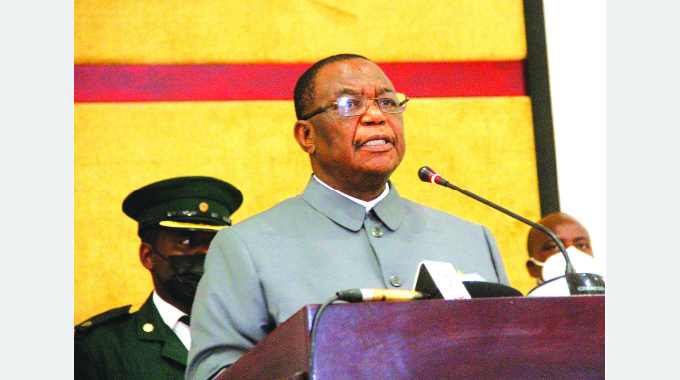All eyes on 2023 National Budget

Business Reporter
Finance and Economic Development Minister Professor Mthuli Ncube will this afternoon present the 2023 National Budget, which analysts and ordinary Zimbabweans say should reinforce economic stability, buttress economic resilience against shocks as well as make available funding for social sectors such as education and health.
In his 2023 pre-Budget Strategy paper Minister Ncube said consistent with the National Development Strategy 1 (NDS1), the country’s macro-economic objectives remain anchored on economic stability, recovery and equitable growth in the face of domestic and external shocks.
He said the shocks continue to undermine socio-economic transformation and development of the country as well as the achievement of Sustainable Development Goals (SDGs).
Going forward, the Treasury chief said priority will be to restore market confidence as well as achieve exchange rate and inflation stability.
“In this regard, the 2023 macro-fiscal framework and policy reforms will focus on sustainable fiscal management, supportive monetary policy measures, addressing structural bottlenecks whilst also sustaining external sector balance,” he said.
Having gone through upheavals during the first half of the year, which were characterised by the erosion of the Zimbabwe dollar and resurgent inflation, the Government continued to roll out policy measures aimed at tackling inflation and stabilising the exchange rate.
The measures included freezing payments to Government contractors accused of driving exchange rate volatility, raising interest rates to curb speculative borrowing and introducing gold coins as an alternative investment instrument while mopping up excess liquidity.
At the time the measures were introduced in July, 2022 the monthly inflation rate was 16,1 percent, but has since cooled to 3,2 percent for the month of October, 2022.
Driven by the pass-through effects of depreciation, Zimbabwe’s inflation rose from 5,39 in September 2018, which marked the beginning of currency reforms, to a post-dollarisation high of 737,5 percent in 2020.
The annual rate then dropped to touch a two-year low of 50,1 percent in June 2021, after measures to improve access to scarce foreign currency via an auction system, but immediately resumed going on a rampage thereafter and peaking at 288 percent in August this year.
Zimbabwe’s annual consumer price inflation eased for the second straight month to 268,8 percent in October of 2022, from 280,4 percent in the prior month.
The rate has been falling since August this year following tight monetary and fiscal measures implemented by authorities.
Similarly, the parallel markets exchange rate has stabilised around $750-850/US$1 and almost converged with the official exchange rates (interbank and auction rates).
“The interventions were worthwhile, but people are still skeptical and we hope the budget will provide ancillary measures to give confidence on the sustainability of the policies,” Carlos Tadya, a Harare-based analyst told The Herald.
“Even with stability currently prevailing, some of the interventions are hurting businesses, particularly high-interest rates, declining spending ability and reduction in aggregate demand.”
But the central bank insists that the pain induced by high-interest rates, after the bank hiked the bank policy rate from 80 to 200 percent, was necessary to reign in inflation and ensure durable stability.
Reserve Bank of Zimbabwe Governor Dr John Mangudya, is on record saying the apex bank is not prepared to immediately review the punitive interest rate regime, as that would be sacrificing stability for short-term pain.
In fact, the bank contends that some of the formal businesses were guilty of speculative activities conducted on the illegal currency market and in equities trading that hurt the Zimbabwe dollar.
However, local business groups said while high-interest rates have been a deterrent to borrowing capabilities, they negatively impact on productivity and capacity utilisation of local businesses.
Tecla Rumbi, a furniture shop owner in central Harare, said while the country has enjoyed stability over the past three months, “we are not so sure how far we will go, and the minister really needs to give us policy direction that gives us confidence.”
“At 200 percent (interest rates), some businesses may not survive,” said Ms Rumbi.
Economist Professor Gift Mugano, said he expected the budget to provide “reasonable to adequate funding” to social sectors to protect the vulnerable groups.
“We are all aware that these sectors have challenges, the education sector is facing serious challenges, and so is the health sector; the minister should put in more resources to support these critical sectors,” said Prof Mugano.
While the economy has seen relative stability since August, on account of the cocktail of fiscal and monetary policy interventions, workers will expect adjustments on tax brackets to improve disposable incomes and drive consumption.
On the taxes, Prof Mugano said there was also a need to introduce measures to address concerns around the Intermediated Money Transfer Tax (IMTT) for both foreign currency and domestic transactions.
“The four percent tax (of the foreign transaction) was supposed to encourage the use of the Zimbabwe dollars but now significant trading is now done in US dollar; maintaining the 4 percent tax will continue increasing the cost of doing business,” he said.
“The same applies to the 2 percent tax (on RTGS transactions), I think it must also be (addressed).
“It came as a short-term measure; as part of the austerity measures between 2018 and 2020.”
Prof Mugano added that the minister needed to come up with innovative ways of funding infrastructure projects. “New and ongoing (projects), so we move away from the current situation where we are funding the construction of roads using cash. We expect diaspora bonds to fund these infrastructure projects,” Prof Mugano said.
Business leaders will inevitably await pronouncements around incentives to drive industrial activity, ease taxation constraints, policy measures to improve access to affordable financing and new interventions to improve the ease of doing business.
Importantly, the fiscal plan should also speak to developments in the global economy, which have negatively impacted economies across the world through fluctuations in oil prices and price surges for other key commodities like fertiliser and grain amid disruptions of the raging war in Eastern Europe.
Three years into Covid-19 and the ongoing global tensions, the world economy is facing a sharp increase in commodity prices and supply disruptions that have led to a significant increase in global inflation, which elicited high-interest rates, and heightened uncertainty about the prospects of recovery.
According to the pre-budget strategy paper, the Covid-19 pandemic bottlenecks have held back supply, including factory closures, restrictions at ports, congested shipping lanes, container shortfalls, and worker shortages because of quarantines.
As such, the World Bank’s June 2022 Global Economic Prospects, projected global growth to slow sharply from 5,7 percent in 2021 to 2,9 percent this year, mainly due to the surge in energy and food prices, along with the supply and trade disruptions triggered by global tensions and the necessary interest rate adjustments now underway.
Against this background, Minister Ncube revised Zimbabwe’s own growth projections, in the mid-term budget, from 5,5 percent to 4,6 percent this year after a stellar 7,4 percent growth last year.
Other observers said the economy currently had limited capacity to withstand major shocks and suggested Minister Ncube should come up with “solid policy interventions to insulate us.”
“A comprehensive plan has to be put in place to mitigate the impacts of the shocks, especially those being caused by climate change as well as external shocks.
“We need an economy that is resilient against these shocks,” Tobias Mareza, a development studies student at a local university said,” Mr Mareza said in an interview.
“More importantly, agriculture is the backbone of the economy and is becoming more and more vulnerable to climate change. While we appreciate the support the sector has been getting from the Government the sector is facing vulnerability to weather-related shocks.
Expectedly, the minister will need to pronounce measures to further the widespread use and desirability of the Zimbabwe dollar in local transactions amid a tendency by many registered and informal enterprises to prefer the US dollar.









Comments